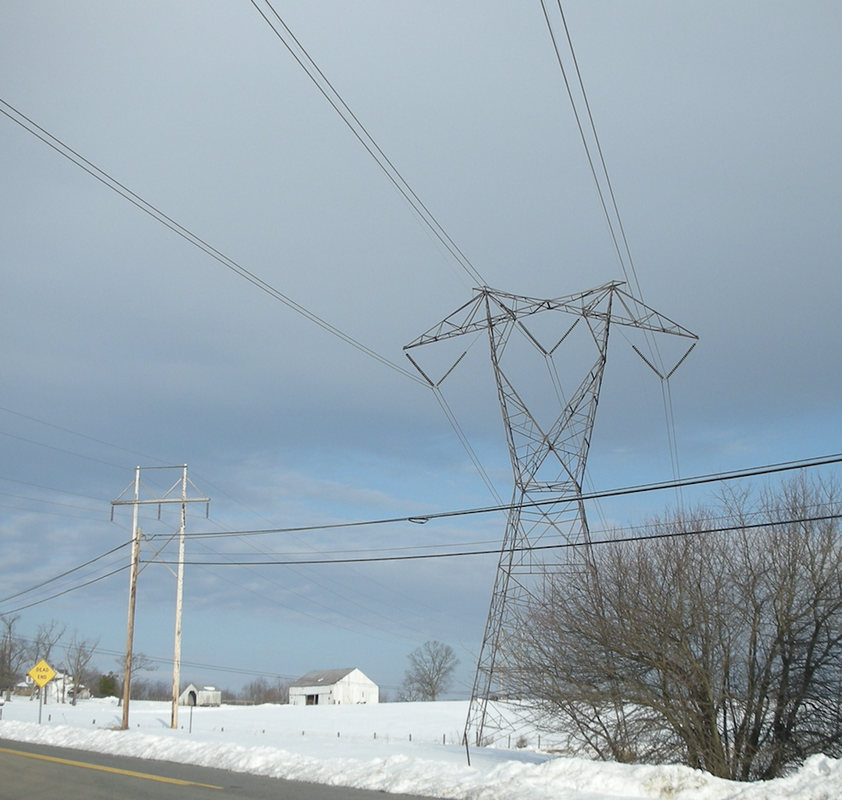It's right in the 5th Amendment to the Constitution:
...nor shall private property be taken for public use, without just compensation.
Eminent domain for existing public utilities has been accepted for years. These companies already have an obligation for public service, and must offer their facilities for public use. Merchant transmission, not so much. Their rates are not regulated and they can do whatever bolsters their balance sheet.
Public utilities use eminent domain only as a last resort. They generally negotiate well over 90% of the easements they require without the use of eminent domain. Condemnation is only filed when construction is imminent, and all permits have been received. A public utility does not want to encumber property that it may never use. The cost of such property is passed through in regulated rates. A public utility condemning property long before it has permits, before its project is engineered, has connection agreements, and is ready to build is pretty much unheard of.
And then there's Grain Belt Express. GBE has recently sent out one of two letters to landowners in Missouri and Kansas. One letter is the legally required 60-day notice before condemnation is filed, and the other is a veiled threat that the 60-day notice could be coming if the landowner does not capitulate. You may have received one of these letters. Some landowners received both (on the same day!) Confusion supreme... one letter says it is official notice, and one letter says it is NOT official notice. It simply can't be both.
The 60-day letter ends with this threat:
If we are not able to come to terms on an
easement agreement within 60 days of this letter, Grain Belt intends to file a condemnation action regarding the referenced property.
Is condemnation the end of negotiation? Not in my experience. I found that condemnation was only the beginning of serious negotiation. The entity condemning my property made bigger and better offers after its condemnation filing, and the offers continued right up until the day it was scheduled for hearing at the court. It was worth a lot of money to the condemning authority to avoid that hearing. Of course, individual appetite for risk will vary. I had nothing much to lose by continuing. The offers I had received up until that point were pitiful.
A landowner who signs voluntarily is allowing GBE rights over his property in perpetuity. However, GBE has generally offered landowners a small percentage of the agreed-upon price at signing. For 10-30 percent of the value of the easement, GBE is an unwanted tenant with full rights to your property for a number of years. It may not have to pay the balance if it later abandons the project before beginning construction.
The Missouri PSC tried to prevent GBE from building a bridge to nowhere by conditioning its permit to require financial commitments for the entire project before constructing transmission facilities on easement property. But what did GBE do? It bought certain properties in full so that they were not easements, and then the company built random transmission facilities without the financial commitment to complete the project. Do you think GBE is prepared to purchase all easements in full without a financial commitment from customers? Nothing says "integrity" like using loopholes to avoid the spirit of conditions designed to protect landowners.
What does GBE intend to do? It recently told the PSC that it had not decided what it was building, or where it might connect its transmission line. Nevertheless, GBE appears poised to begin condemnation of more than 50% of the easements necessary to build its project in Kansas and Missouri. The project has no connection. It's essentially a bridge to nowhere. A prudent public utility would never do that. A prudent legislature would never allow its constituents to be victimized this way.
What's still missing?
Customers! GBE has not publicly announced that it has enough customers to make the project economically viable. Coupled with GBE's recent skirting of the financial commitment condition, it leads me to believe GBE does not have enough customers. In fact, there's been no public announcement of an open season for potential customers to begin negotiations with GBE under its Negotiated Rate Authority. Who condemns land for a project that may never be built?
County assents! GBE still needs the assent of the counties through which it will pass before it begins construction. No news on this front. Who condemns land for a project that does not have all necessary assents?
Illinois! Invenergy's attempt to make legislative change to the definition of public utility has still not passed. Keep your eye on this ball and keep contacting Illinois legislators! GBE is years away from a permit in Illinois, if ever! Who condemns land for a project that has no end point?
Kansas! GBE cannot begin construction in Kansas without a permit in Illinois, or without making significant changes to permit conditions in Kansas. Crickets here also. Who condemns land for a project that cannot be built?
A company playing loose and fast with a new toy named eminent domain, that's who. A company with no obligation to the public, only to its bottom line, that's who.
Grain Belt Express putting its eminent domain cart before its project horse has created one of the biggest eminent domain travesties in history.
Keep your chins up, folks. It's far from over.

 RSS Feed
RSS Feed